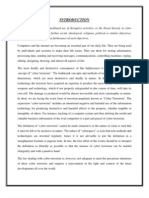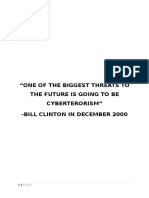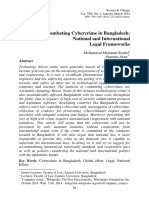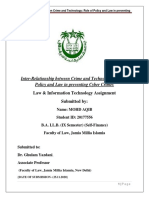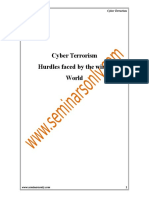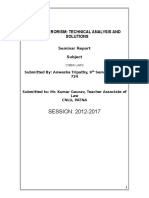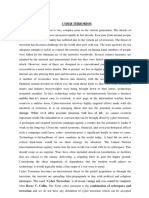CYBER TERRORISM: Terrorism Without Weapon: Team Members
CYBER TERRORISM: Terrorism Without Weapon: Team Members
Uploaded by
kundanky@live.inCopyright:
Available Formats
CYBER TERRORISM: Terrorism Without Weapon: Team Members
CYBER TERRORISM: Terrorism Without Weapon: Team Members
Uploaded by
kundanky@live.inOriginal Title
Copyright
Available Formats
Share this document
Did you find this document useful?
Is this content inappropriate?
Copyright:
Available Formats
CYBER TERRORISM: Terrorism Without Weapon: Team Members
CYBER TERRORISM: Terrorism Without Weapon: Team Members
Uploaded by
kundanky@live.inCopyright:
Available Formats
CYBER TERRORISM: Terrorism without Weapon
TEAM MEMBERS:
1. ANJALI SINGH Contact No. : 9910802220 2. SUGANDHA Contact No. : 9873560716 3. KUNDAN KUMAR YADAV Contact No. : 9873213321 4. MOHIT GUPTA Contact No. : 9718983849 5. AJIT SINGH Contact No. : 9410278658 E-Mail ID : as085776@gmail.com E-Mail ID : mohitgupta1233@gmail.com E-Mail ID : kundanky@gmail.com E-Mail ID : sugandha2008.2008@rediffmail.com E-Mail ID : anjalisingh1609@rediffmail.com
Under the Guidance of:
Prof. Pramod Garg Asstt. Professor Sunder Deep College of Management Technology Ghaziabad
CYBER TERRORISM: Terrorism without Weapon
An evil exists that threatens every man, woman and child of this great nation. We must take steps to ensure our nations security and protect our homeland, Adolf Hitler, when announcing to Gestapo to the people. What comes to your mind when you hear the word Terrorism? Most people will refer to the attacks on the World Trade Center and Pentagon on September 11, 2001. Of course, these were horrific attacks especially considering over 3,000 people lost their lives that day. There was no precedent like that before. Unfortunately, though, that is not the only terrorist attack in history. Terrorism has existed in the world for quite a long time. It is intended to create massive fear and involves a planned attack for a purpose, often against something or someone. Terrorism is meant to have an audience. The differences between various terrorist attacks involve the people, purpose, and how it is carried out. Terrorism is a criminal activity that is planned in advance and perform later to attract attention of people or government by carrying out a bloody act. Terrorism is meant to be an act of violence to bring about some change, usually not committed by those officially in the government. They want to be dramatic and have a hope to gain power and influence because of the act.
WHAT IS CYBER TERRORISM?
The word cyber terrorism firstly coined by Berry Collin, a senior research fellow in Californian Institute of Security and Intelligence, in 1977. The Center for Strategic and International Studies (CSIS) has defined it as The use of computer network tools to shut down critical national infrastructures (e.g., energy, transportation, government operations) or to coerce or intimidate a government or civilian population. Dr. Tafoya, a retired FBI special agent, defines cyber terror as The intimidation of civilian enterprise through the use of high technology to bring about political, religious, or ideological aims, actions that result in disabling or deleting critical infrastructure data or information. If you ask 10 people what cyber terrorism is, you will get at least nine different answers! BUT! When those 10 people are computer security experts, they explain what is reality? The expression "cyber terrorism" includes: A intentional negative and harmful use of the information technology for producing destructive and harmful effects to the property, whether tangible or intangible, or people. For instance, hacking of a computer system and then deleting the useful and valuable security information of the rival is a part and parcel of cyber terrorism. The definition of "cyber terrorism" cannot be made exhaustive as the nature of crime is such that it must be left to be inclusive in nature. The nature of "cyberspace" is such that new methods and technologies are invented regularly; hence it is not advisable to put the definition in a straightjacket formula or pigeons hole. In fact, the first effort of the Courts should be to interpret the definition as liberally as possible so that the menace of cyber terrorism can be tackled stringently and with a punitive hand. The law dealing with cyber terrorism is, however, not adequate to meet the precarious intentions of these cyber terrorists and requires a rejuvenation in the light and context of the latest developments all over the world. The laws of India have to take care of the problems originating at the international level because the
Internet, through which these terrorist activities are carried out, recognises no boundaries. Thus, a cyber terrorist can collapse the economic structure of a country from a place with which India may not have any reciprocal arrangements, including an "extradition treaty". In an attempt to define cyber terrorism more logically, a study is made of definitions and attributes of terrorism developed this attribute list is then examined in detail with the addition of the computer and the Internet considered for each attribute. Using this methodology, the online world and terrorism is synthesized to produce a broader but more useful assessment of the potential impact of computer-savvy terrorists. Most importantly, the concept of traditional cyber terrorism, which features the computer as the target or the tool is determined to be only a limited part of the true risk. SOME EXAMPLES OF CYBERTERRORISM
Computer and internet played a key role in the execution of the 9/11 attacks. This concept is
critical in evaluating the true problem we face in the virtual world: the use of computers in terrorist acts. While there are possible technical solutions that would have made this particular scenario more difficult, this task does not currently fall under the auspices of any government agency tasked with fighting cyber terrorism. Furthermore, as each of the actions cited above was not necessarily illegal prior to the attack, detection and prevention is made all the more difficult. Recently terrorists used a computer in Delray Beach, Florida to make their travel plans and purchase tickets, as well as using public library computers in the same town (Holland, 2001). How large the role computers played in the organization and execution of the attacks is, at this point. Under Investigation of Mumbai attack this is get to know that the voiceover internet protocol phone are brought by a Spain terrorist, use them for together belongingness. Indian Muzahidin organization send an email to television channels just before 5 minutes of Ahmedabad bomb blasts.
WHY TERRORIST CHOOSE CYBER MODE
Loss of integrity, such that information could be modified improperly Loss of availability, where mission critical information systems are rendered unavailable to authorized users. Loss of confidentiality, where critical information is disclosed to unauthorized users; and, Physical destruction, where information systems create actual physical harm through commands that cause deliberate malfunctions.
SOLUTIONS TO THE PROBLEM
Network Management: Change the network configuration when defects become visible, Check with venders for upgrades and patches Audit systems and check logs to help in detecting and tracing an intruder, If you are ever unsure about the safety of a site, or receive suspicious email from an unknown address, don't access it. Security Architecture & Design; apply those machines which are having higher securities, effective lock expertise System & Software Integrity. User Accountability and Training: Training related to know what equipments are used and and how it can be use for prevention of hacking the mail accounts and their passwords of the users.
Vigilant citizenry: The menace of cyber terrorism is not the sole responsibility of State and its instrumentalities. The citizens as well as the netizens are equally under a solemn obligation to fight against the cyber terrorism. Judicial response: The judiciary can play its role by adopting a stringent approach towards the menace of cyber terrorism. Legislative commitment: The legislature can provide its assistance to the benign objective of elimination of cyber terrorism by enacting appropriate statutes dealing with cyber terrorism. Executives concern: The Central Government and the State Governments can play their role effectively by making various rules and regulations dealing with cyber terrorism and its facets from time to time.
CONCLUSION
The problem of cyber terrorism is multilateral having varied facets and dimensions. Its solution requires rigorous application of energy and resources. It must be noted that law is always seven steps behind the technology. This is so because we have a tendency to make laws when the problem reaches at its zenith. We do not appreciate the need of the hour till the problem takes a precarious dimension. At that stage it is always very difficult, if not impossible, to deal with that problem. This is more so in case of offences and violations involving information technology. One of the argument, which is always advanced to justify this stand of non-enactment is that the measures suggested are not adequate to deal with the problem. It must be appreciated that something is better then nothing. The ultimate solution to any problem is not to enact a plethora of statutes but their rigorous and dedicated enforcement. The courts may apply the existing laws in a progressive, updating and purposive manner. It must be appreciated that it is not the enactment of a law but the desire, will and efforts to accept and enforce it in its true letter and spirit, which can confer the most strongest, secure and safest protection for any purpose. The enforcement of these rights requires a qualitative effort and not a quantitative effort.
You might also like
- Combating Cybercrime in Bangladesh: National and International Legal FrameworksNo ratings yetCombating Cybercrime in Bangladesh: National and International Legal Frameworks17 pages
- Law and IT Assignment (MOHD AQIB SF) PDFNo ratings yetLaw and IT Assignment (MOHD AQIB SF) PDF25 pages
- Dr. Ram Manohar Lohiya National Law University, Lucknow: Project TopicNo ratings yetDr. Ram Manohar Lohiya National Law University, Lucknow: Project Topic12 pages
- Cybercrime in The Society Problems and PreventionsNo ratings yetCybercrime in The Society Problems and Preventions34 pages
- Cyber Terrorism Hurdles Faced by The Wired WorldNo ratings yetCyber Terrorism Hurdles Faced by The Wired World26 pages
- Dr. Ram Manohar Lohiya National Law UniversityNo ratings yetDr. Ram Manohar Lohiya National Law University14 pages
- The Problem and Its Setting Background of The Study100% (1)The Problem and Its Setting Background of The Study22 pages
- "One of The Biggest Threats To The Future Is Going To Be Cyberterorism" - Bill Clinton in December 2000No ratings yet"One of The Biggest Threats To The Future Is Going To Be Cyberterorism" - Bill Clinton in December 200021 pages
- Army Institute of Law, Mohali: Grey Areas of It ActNo ratings yetArmy Institute of Law, Mohali: Grey Areas of It Act10 pages
- Cyber Crime: Challenges and Its ClassificationNo ratings yetCyber Crime: Challenges and Its Classification3 pages
- By National ICT Security and Emergency Response Centre (NISER)No ratings yetBy National ICT Security and Emergency Response Centre (NISER)3 pages
- Answer To The Question No - B: MD Nahid Hossain ID-19-39552-1No ratings yetAnswer To The Question No - B: MD Nahid Hossain ID-19-39552-12 pages
- GD Goenka Universitys Conference On LawNo ratings yetGD Goenka Universitys Conference On Law16 pages
- "One of The Biggest Threats To The Future Is Going To Be Cyberterorism" - Bill Clinton in December 2000No ratings yet"One of The Biggest Threats To The Future Is Going To Be Cyberterorism" - Bill Clinton in December 200023 pages
- Lect 1 Introduction To Cyber CriminologyNo ratings yetLect 1 Introduction To Cyber Criminology28 pages
- Cyber Terrorism, IPR in Cyberspace, Financial CrimesNo ratings yetCyber Terrorism, IPR in Cyberspace, Financial Crimes30 pages
- Cyber Space, Laws and Crimes: Tentative Index50% (2)Cyber Space, Laws and Crimes: Tentative Index2 pages
- The Future of Cybersecurity: Guarding the Digital Frontier: Strategies, Tools, and Best PracticesFrom EverandThe Future of Cybersecurity: Guarding the Digital Frontier: Strategies, Tools, and Best PracticesNo ratings yet
- Safeguarding the Digital Fortress: A Guide to Cyber Security: The IT CollectionFrom EverandSafeguarding the Digital Fortress: A Guide to Cyber Security: The IT CollectionNo ratings yet
- I'm A Hacker, But I'm The Good Kind of Hackers. and I've Never Been A Criminal. - Mikko Hypponen 01700764020No ratings yetI'm A Hacker, But I'm The Good Kind of Hackers. and I've Never Been A Criminal. - Mikko Hypponen 017007640202 pages
- D2-S1-Cybersecurity in Banking Threats, Challenges and SolutionsNo ratings yetD2-S1-Cybersecurity in Banking Threats, Challenges and Solutions67 pages
- Kumpul PDF - Nonversation by Valerie PatkarNo ratings yetKumpul PDF - Nonversation by Valerie Patkar348 pages
- Ssba Security Risk Assessment and Risk Management Plan Template - 0No ratings yetSsba Security Risk Assessment and Risk Management Plan Template - 022 pages
- The Economist - 18 - 24 July 2015 (Oke)No ratings yetThe Economist - 18 - 24 July 2015 (Oke)28 pages
- The Impact of Information Technology inNo ratings yetThe Impact of Information Technology in48 pages
- 7.FAIR Cyber Security Risk Quantification in Logist - 2024 - Procedia Computer SCNo ratings yet7.FAIR Cyber Security Risk Quantification in Logist - 2024 - Procedia Computer SC10 pages
- Set Up OpenDMARC With Postfix On CentOSRHEL To Block Email Spoofing100% (1)Set Up OpenDMARC With Postfix On CentOSRHEL To Block Email Spoofing11 pages
- Combating Cybercrime in Bangladesh: National and International Legal FrameworksCombating Cybercrime in Bangladesh: National and International Legal Frameworks
- Dr. Ram Manohar Lohiya National Law University, Lucknow: Project TopicDr. Ram Manohar Lohiya National Law University, Lucknow: Project Topic
- Cybercrime in The Society Problems and PreventionsCybercrime in The Society Problems and Preventions
- The Problem and Its Setting Background of The StudyThe Problem and Its Setting Background of The Study
- "One of The Biggest Threats To The Future Is Going To Be Cyberterorism" - Bill Clinton in December 2000"One of The Biggest Threats To The Future Is Going To Be Cyberterorism" - Bill Clinton in December 2000
- Army Institute of Law, Mohali: Grey Areas of It ActArmy Institute of Law, Mohali: Grey Areas of It Act
- By National ICT Security and Emergency Response Centre (NISER)By National ICT Security and Emergency Response Centre (NISER)
- Answer To The Question No - B: MD Nahid Hossain ID-19-39552-1Answer To The Question No - B: MD Nahid Hossain ID-19-39552-1
- "One of The Biggest Threats To The Future Is Going To Be Cyberterorism" - Bill Clinton in December 2000"One of The Biggest Threats To The Future Is Going To Be Cyberterorism" - Bill Clinton in December 2000
- Cyber Terrorism, IPR in Cyberspace, Financial CrimesCyber Terrorism, IPR in Cyberspace, Financial Crimes
- The Future of Cybersecurity: Guarding the Digital Frontier: Strategies, Tools, and Best PracticesFrom EverandThe Future of Cybersecurity: Guarding the Digital Frontier: Strategies, Tools, and Best Practices
- Safeguarding the Digital Fortress: A Guide to Cyber Security: The IT CollectionFrom EverandSafeguarding the Digital Fortress: A Guide to Cyber Security: The IT Collection
- I'm A Hacker, But I'm The Good Kind of Hackers. and I've Never Been A Criminal. - Mikko Hypponen 01700764020I'm A Hacker, But I'm The Good Kind of Hackers. and I've Never Been A Criminal. - Mikko Hypponen 01700764020
- D2-S1-Cybersecurity in Banking Threats, Challenges and SolutionsD2-S1-Cybersecurity in Banking Threats, Challenges and Solutions
- Ssba Security Risk Assessment and Risk Management Plan Template - 0Ssba Security Risk Assessment and Risk Management Plan Template - 0
- 7.FAIR Cyber Security Risk Quantification in Logist - 2024 - Procedia Computer SC7.FAIR Cyber Security Risk Quantification in Logist - 2024 - Procedia Computer SC
- Set Up OpenDMARC With Postfix On CentOSRHEL To Block Email SpoofingSet Up OpenDMARC With Postfix On CentOSRHEL To Block Email Spoofing




